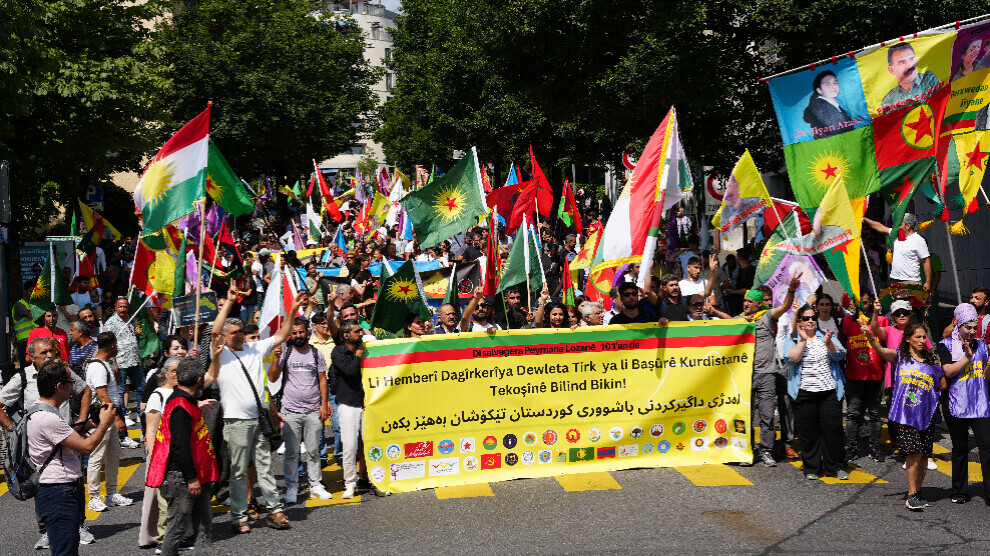Rally to protest the Treaty of Lausanne
With the Treaty of Lausanne, Kurdistan was transformed into an international colony in 1923. Thousands of people in the city on Lake Geneva to protest the agreement.
With the Treaty of Lausanne, Kurdistan was transformed into an international colony in 1923. Thousands of people in the city on Lake Geneva to protest the agreement.

With the Treaty of Lausanne, the victorious powers of the First World War enforced the four-part division of Kurdistan on 24 July 1923. Since then, Kurds have been subjected to genocide, assimilation and massacres under the sovereignty of the states of Turkey, Iraq, Iran and Syria. The agreement laid the foundations for the discrimination of the Kurdish people and the denial of their existence. To point out the ongoing and serious consequences of the treaty for Kurdish society and to condemn the imposed circumstance of political and legal non-existence, several thousand people protested in Lausanne on Saturday.

The demonstration was called for by an alliance of 36 parties, organizations and institutions, including PUK, Goran, the self-administration in Rojava, KCDK-E, TJK-E, FEDA, KKP, PJAK, PYD, ESU, PIK and the Kurdish Institute in Switzerland.
The event began in the afternoon with a rally on the Place des Pionnières and numerous political speeches. Zübeyde Zümrüt, co-chair of the Europe-wide umbrella organization KCDK-E, said: "The Treaty of Lausanne laid the foundation for a tragedy that manifested itself in a genocidal policy that claimed tens of thousands of lives."

Zümrüt added: "This trail of blood from colonialism continues to the present day and we are still fighting against it today. The more than 100-year-old policy of denial and genocide continues in the Turkish state's occupation attacks in South Kurdistan, in the invasions of Rojava and in the total isolation of Abdullah Öcalan on the prison island of Imrali. None of this would be possible without the Treaty of Lausanne. Nevertheless, the states responsible are not prepared to correct and solve the problems arising from the agreement."

National Councillor Laurence Fehlmann Rielle (SP) pointed out that the Treaty of Lausanne had serious consequences not only for Kurds, but also for other nations in Kurdistan, and pointed out that the Turkish state is in a "war against the peoples" in Nagorno-Karabakh, Rojava, North and South Kurdistan. All signatories of the agreement with Turkey - France, Great Britain and the other powers that won the First World War - are "responsible for the tragedy in Kurdistan" and therefore have a duty to take action against the government in Ankara.
Rielle also addressed the conditions in which Abdullah Öcalan is being held and demanded that the isolation imposed on the 75-year-old be internationally recognized as "torture." Rielle also paid tribute to the 69 Nobel Prize winners who recently publicly called for freedom for Öcalan and to resume a dialogue with him. "The international community must take responsibility at this point," said Rielle.
Lausanne city councilor Davit Payot reiterated his solidarity with the "legitimate resistance" of the Kurdish people, and Marion Novet from the Swiss Feminist Strike Collective also spoke out in favor of supporting the Kurds' demands for self-determination and freedom.

After further words from PYD politician Fuat Omar, the demonstration started with the destination Château d'Ouchy on the shores of Lake Geneva, where the conclusion of the Treaty of Lausanne was celebrated 101 years ago.

The demonstration culminated in a final rally at which representatives of the YNK and Goran as well as the KCK representative Zübeyir Aydar spoke. He stressed that the Kurdish liberation movement is fighting for all people in four-part Kurdistan. "We do not accept that our people have been made minorities in oppressive states by colonial borders drawn here in Lausanne, and that we have been deprived of the opportunity to invoke the right of peoples to self-determination. Our resistance against the colonization of Kurdistan will continue until the systematic policy of denial, exploitation and genocide ends. The guerrillas fighting in the mountains against the occupation of South Kurdistan are once again setting an example. Because Kurdistan and its achievements are in considerable danger. Our solidarity should be with the guerrillas who are defending us all."